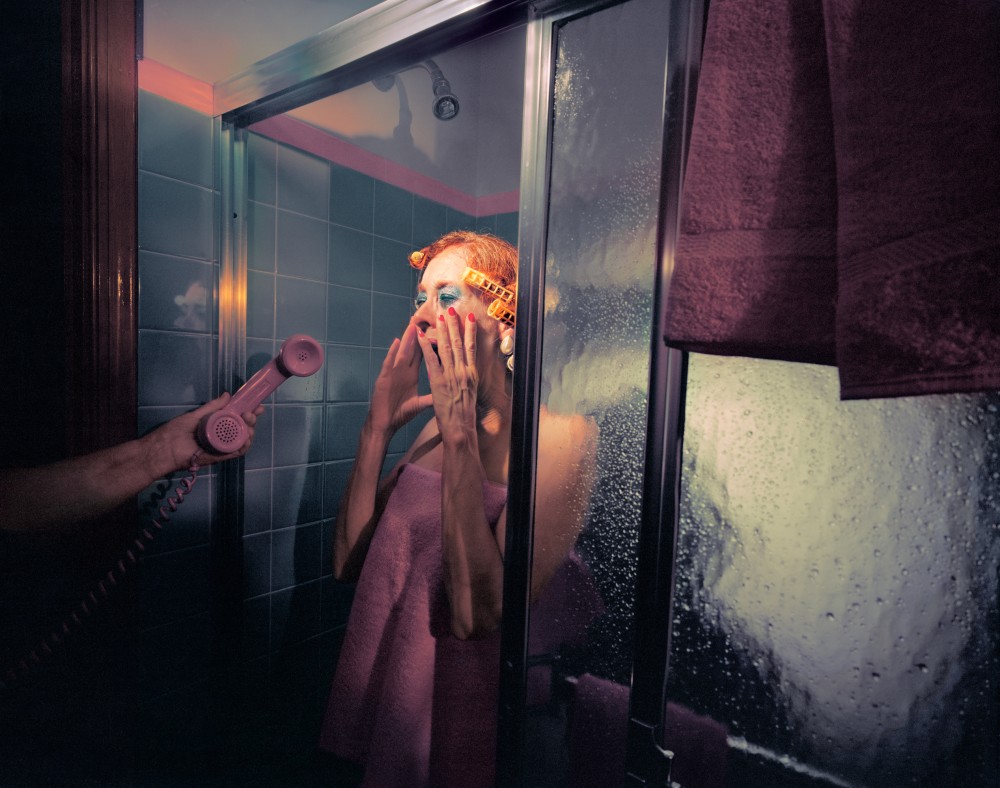Above Image: Episode Four
Tell us about your work featured within the Temptation Issue.
The two images, “Episode Four” and “Response” were taken from the same project, “Situations”. The project is divided into two parts. “Episode Four” represents Part I of the series, which investigates self-identity and mental illness while “Response” from Part II represents conservative societal reactions to homosexuality. There is a specific puritanical aspect to lifestyle that still exists in a suburban culture that is unwilling to accept anything other than the “ideal” 1950s family life. I am challenging those perceptions on normative sexuality by placing family members’ reactions to learning of a loved one’s sexual identity.
Where do you see your work going? What is next in the development of your project?
While culturally relevant and considered, “Situations” was mostly inspired by autobiographical narratives based upon the feelings of depravity due to growing up homosexual in a non-accepting culture. Having lived in New York for the past few years and growing out of my own homophobia into more self-acceptance, I have begun a project that deals with the urban gay culture. There is an interest in the 1970s in the project, the time where anonymity and hidden encounters were celebrated, as gay men were able to finally disassociate guilt and shame and replace it with experimentation and empowerment by having this newfound sexual freedom. This time was prior to the initial AIDS epidemic, after the Stonewall riots, where, seemingly, the worst things that could happen by an abundance of casual sex would be your garden variety sexually transmitted infection. There is an interest that lies within that sexual fantasy culture and the dichotomy of desire and danger. One of my favorite quotes I have found regarding this time period came from photographer Tom Bianchi, who said, “I needed to fuck mindlessly, or unconsciously, or not quite there to get to a place where I could do it with more sensitivity or more joy.” This quote has become an inspiration for the project that helps to explain the sexual development of a gay man that finds himself finally comfortable in his sexual identity after being casted into a begrudged and repressed culture.
What inspires you?
Cinema is a large inspiration for my work, the process of selecting each item in a scene and creating emotion from the top down is an exceptional feat. There is the escapist element while dissociating with who I was and who I could be while watching the cinematic worlds created by auteurs like Hitchcock, Kubrick, and Lynch. These directors created a culture with a new vision and we are transported there with each viewing. The featured characters act in a way I only dreamt of without the self-consciousness that I found to be so paralyzing. The artificial element of cinema allows for this beautifully controlled emotional experience that enforces the feelings of anguish and despair. Living the lives of these controlled characters was much less frightening than stepping out of the closet and acknowledging other qualities of myself that I had determined to be abnormal at a very young age. I sometimes feel as a voyeur watching human relationships and developments and allowing those to combine with cinematic contexts.
Our theme was Temptation. How do you relate to this within your work and how would you define temptation?
Temptation begins with a desire; a daring ability to take a chance. I intend to make work investigating the human psyche and exploring the desires, temptations and hesitations of identity, sexuality, and abnormalities. Temptation is a willingness to acknowledge the quirks, emotionally charged and frightening aspects of yourself and allow them to accumulate into a desire. Being tempted is knowing and recognizing your desire for something or someone without having to consciously deem whether it is or is not appropriate—socially or otherwise. Obviously there are different levels of temptation, but I believe all to stem from an initial restraint. Many factors could impose these restraints—cultural, familial—but perhaps the biggest fear in temptation is acknowledging your own restrictions and boundaries you create for yourself.

Response

